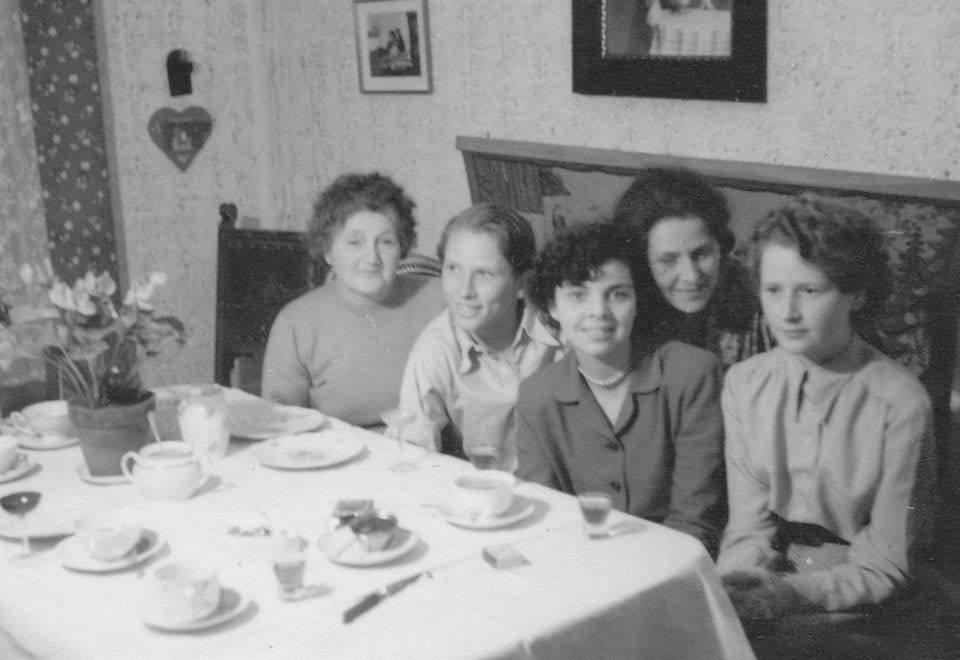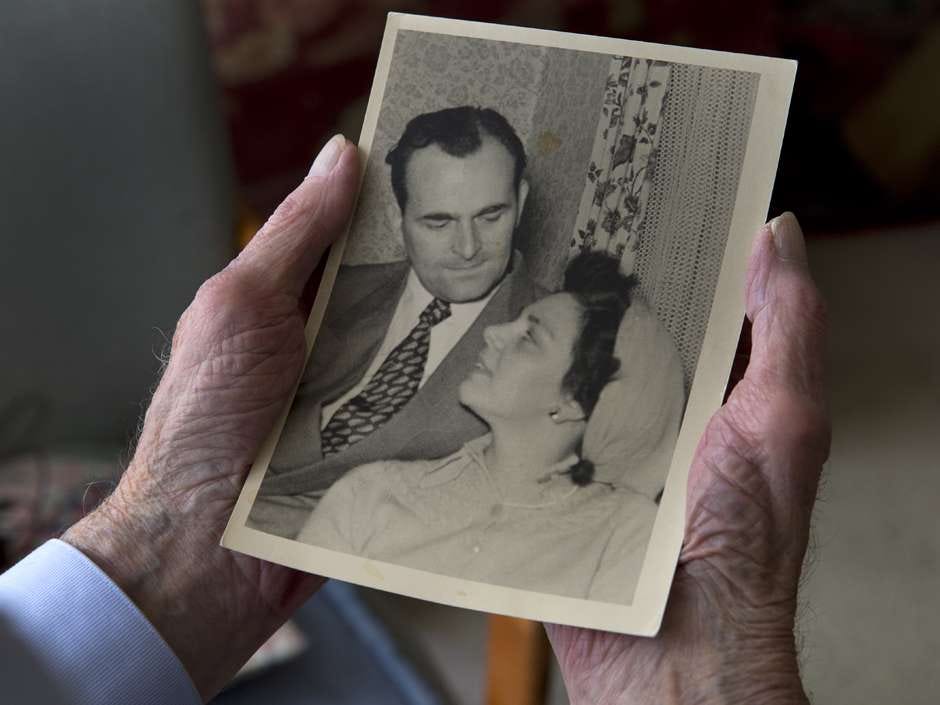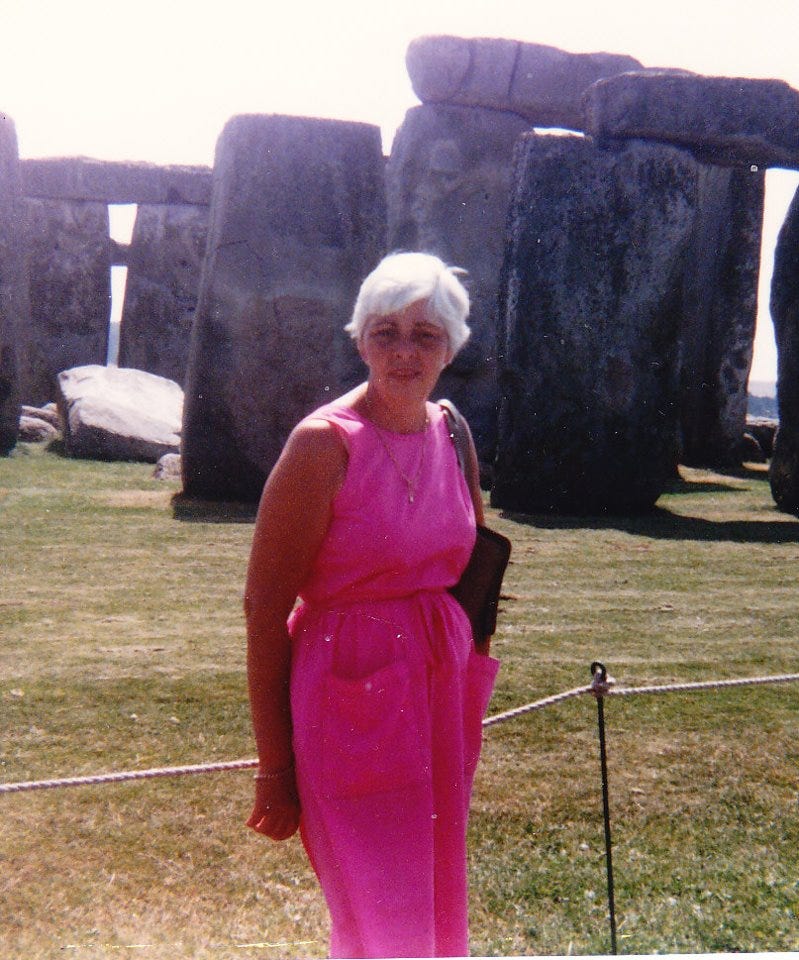Today would have been my mother's 96th birthday had she not died from cancer in 1999. Mum's early life was marked by totalitarianism and misogyny. During another time, and if she had come from something other than bohemian/working class stock, my mother's many talents would have been nurtured and appreciated.
My Mum was born in Hamburg on October 20, 1928. While she suckled her mother’s breast, Germany's democracy was dying from a politics metastasised by Nazism. Had she lived until now, Mum would have recognised 2024 for what it is, a point of no return for democracy. It would have sickened but not surprised her how the most privileged in today's society destroyed democracy and the social welfare state to enrich themselves.
The start of my mother's life was like the lyrics from a Kurt Weil song because it was filled with communists, spivs, and national socialists lurking in the shadows. She was the bastard child of a working-class gadfly who couldn’t decide if his ideology was womanising or socialism.
Her mother was a manager for a hotel known for its cheap rooms, affordable grub, and prostitutes free of venereal disease in Hamburg's Reeperbahn district.
It wasn’t a good year to be born working class in Germany. Its ordinary citizens were paying a heavy price in reparations to the Allies for being the losers in the first Great War ten years previous. But it was the best year Mum saw in Germany until after the Second World War, as each year that followed 1928 was more unsettling than the next.
In 1929, Wall Street crashed and ushered in the Great Depression. By 1930, millions of Germans were out of work and on the breadline. In 1932, the Nazis became the largest party in Germany's Reichstag. Finally, in 1933, Hitler became Chancellor, and the rest, as they say, is history.
The economic and political instability of the times necessitated my grandmother become the mistress of a man who could provide physical and monetary safety during an era of extremism. As my mother said in later life about my grandmother’s lover/provider. “He wasn’t the best sort, but there could have been worse.”
Uncle Henry, as he was known to my mother, was an overweight, opportunistic importer of tobacco products. On weekdays, Henry deserted his wife and lived with my grandmother in an apartment he rented for her- located in a leafy suburb of Hamburg near its airport. On weekends he returned to his wife and five children, who lived in a small town north of the city.
To Henry, this division of affection and time was a perfect arrangement except he had one inconvenience- my mother. It’s not that he disliked my mum, just her presence in his life. “I was a talkative inquisitive child wrapped around my mother’s apron strings. I disturbed his lovemaking to my mother and his business scheming.”
Henry was good at schemes because he had convinced an importer of board games, who also happened to be a communist to sell a controlling interest in his company. It was a ruse to protect him against the Nazis. (In Uncle Henry's favour, he did keep his word, and the man survived Hitler.)
Henry had my mother disappear from his affair with my grandmother. He arranged that she live as a foster child to a working-class family who were a bit short of cash.
There, when she was four, my mother witnessed Nazi Storm troopers shoot dead communists on the rooftops which surrounded her foster parent's apartment in Hamburg's Altona district. That day was known as Bloody Sunday to Germany’s socialists.
As Mum grew older, Hitler's Nazism and antisemitism consumed Germany in irrational hate. Being a bastard child of a trade union activist who didn't live with either parent but in a privately arranged foster home raised eyebrows among Nazi government officials. Investigations were started on her racial background as well as the politics of her parents and her foster parents. At the time, these investigations terrified my mum enough that she asked a friend if things went bad "would she hide her." The friend said in no uncertain terms she would denounce her should it be discovered, she was a Jew. The investigation turned up nothing but still, the Nazis wanted to remove my mother from her foster parent's home to be placed in the care of a more politically radicalised family. Fortunately, Uncle Henry had either enough pull or money to make it all go away.
During her teenage years, my mum didn’t dissent like Sophie Scholl because that takes extraordinary courage. However, she tried not to conform to the norms. She spoke out of turn and questioned the war as much as possible. She was a problem teenager, even for her foster parents, who couldn’t handle her ”Hedda Gabbler” outbursts or her “dramatic” suicide attempt.
My grandmother’s lover had my mum exiled for a time on a farm. There the farmer and Nazi party member sexually assaulted her when my mother was thirteen. After the rape, my mother was chucked out for insubordination and indentured to a Nazi family in Cologne. But a dropped bomb from an air raid quickly ended her tenure there as it caused third-degree burns on her back that required a stay in hospital.
It was in that hospital my mum fully grasped the true horror of the war being fought all around her because her roommate was a 5-year-old boy whose legs were crushed when he was buried in rubble from an air raid that levelled his apartment. He called my mother "Edelweiss," and then one day said to her, "I can't feel my legs," before dying painfully from gangrene.
I was twenty and too wet behind the ears when my mum told me this story about her experiences in a hospital during wartime. When she was alive, I was more concerned with making sense of who I was to comprehend how complex my mother was as an individual.
Mum was an iceberg of secrets that were shared with no one. Early in my parent's marriage, she left my father and returned to Germany in 1949. It was not the life she wanted nor the life my dad had sold her before they wed. In Germany, she went on a wild scramble through its war-ruined cityscapes in search of her father who had disappeared in Berlin in April 1945.
She didn't find her father. But she encountered something else that clandestinely creased her heart for the rest of her life. Mum fell in love with an Iranian who was a doctoral student at a German university.
I don't know how or why her affair with the Iranian ended, it just did. When it was over Mum returned to live with my father. They were married for 51 years, By all accounts my parent’s marriage and relationship was fulfilling and loving. It was everything my father ever wanted but for my mother probably not.
On her deathbed, my mum said something to me which at the time I believed was about my long-term relationship with a Russian that had just ended the month before when she returned to Moscow forever. "You will always wonder what became of them? You will always wonder if they are happy, healthy and loved. Wish her happiness because that is what you do if you truly love them." At the time, I thought she was talking about me. Now, I am sure, it was a lover from long ago, she was speaking about.
Happy Birthday, Mummy.
Thanks for reading and supporting my Substack. Your support keeps me housed and also allows me to preserve the legacy of Harry Leslie Smith. Your subscriptions are so important to my personal survival because like so many others who struggle to keep afloat, my survival is a precarious daily undertaking. The fight to keep going was made worse- thanks to getting cancer along with lung disease and other co- morbidities which makes life more difficult to combat in these cost of living crisis times. So if you can join with a paid subscription which is just 3.50 a month or a yearly subscription or a gift subscription. I promise the content is good, relevant and thoughtful. But if you can’t it all good too because I appreciate we are in the same boat. Take Care, John






Wow, this is powerful writing, thanks for sharing.
"It would have sickened but not surprised her how the most privileged in today's society destroyed democracy and the social welfare state to enrich themselves." ... you write my thoughts ... thank you